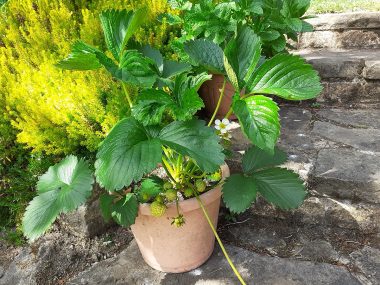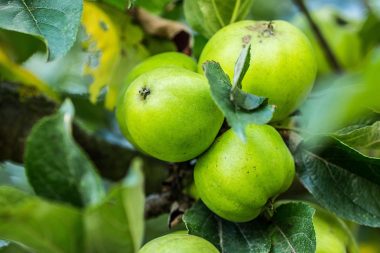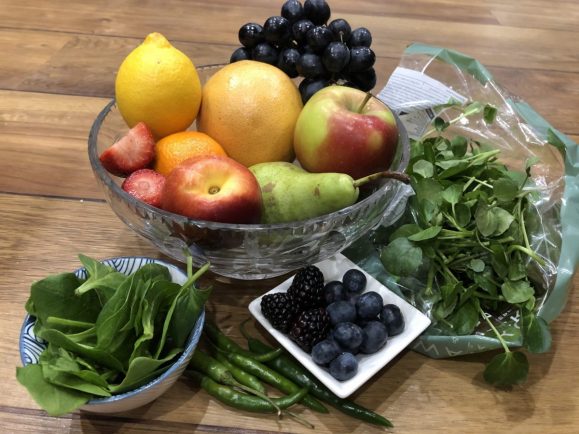NOW is the perfect time to start preparing your planting for the growing season, and horticulture charity Garden Organic has 12 good reasons why.
UK gardeners are being encouraged to think more carefully about the fruit and vegetables they buy after research highlighted a hidden cocktail of pesticides in our shop-bought five a day.
Garden Organic, a charity which has been at the forefront of the organic horticulture movement for 60 years, has made the call following analysis of government data by Pesticide Action Network (PAN) UK.
The study found an amazing 89per cent of strawberries, 78pc of grapes, 81pc of pre-packed salads and 52pc of apples were amongst the “dirty dozen” shown to contain multiple pesticide residues. In some cases, this included up to 14 different pesticides.
Each year the Government tests a range of produce, but they set the safety levels on just single pesticide chemicals.
The charity says this does not cover the multiple residues that many fruit and vegetables are showing, and it is these multiple residues (aka the ‘pesticide cocktails’) that cause most concern.
PAN UK’s analysis* reveals how many samples contain multiple residues and demonstrates that consumers are eating a hidden mix of toxic chemicals.
“The Dirty Dozen”
- Grapefruit (99per cent)
- Clementines, mandarins and satsumas (96pc)
- Strawberries (89pc)
- Pre-packed salads (81pc)
- Grapes (78pc)
- Lemons (75pc)
- Peaches and Nectarines (67pc)
- Pears (66pc)
- Spinach (57pc)
- Chilli pepper (57pc)
- Apples (52pc)
- Blackberries and blueberries (51pc)
James Campbell, Chief Executive from Garden Organic, said: “It’s shocking to see the extent of the hidden cocktail of pesticides in many of the foods we readily consume day to day, and we’re urging consumers to sit up, take notice, and take action to help improve the health and wellbeing of themselves and their family.
“The research has shown that items which many of us routinely pick up and put into our shopping basket, such as strawberries, grapes, pre-packed lettuce and apples can contain traces of many different pesticides.
Sadly, it’s not sufficient to simply wash or peel them as the pesticides are often systemic and contained within the entire piece of produce.
“It’s more important than ever to look for organic options which are free of pesticides.
“But if you are looking for a cost-effective way to better understand where your food is coming from, and what it contains, then we’d strongly recommend trying to grow some of these fruit or vegetables at home yourself.
James says many can be grown in really small places – sometimes in pots, hanging baskets or window boxes, so it’s not even necessary to have a huge garden.
According to PAN UK, certain groups of people such as young children and expectant mothers, are more susceptible to the effects of pesticides, and their research states that exposure to certain pesticides at critical stages in development can interfere with some organs and their function.
They have also highlighted that endocrine disrupting chemicals, which affect hormone systems in the body, have been associated with learning disabilities, attention deficit disorder, and cognitive and brain development problems.
James Campbell from Garden Organic added: “With a surprisingly small amount of effort, it’s possible to have fresh, tasty produce from your plot – and you can’t get more locally sourced than that.
Most importantly, by growing organic, you can feel confident in the knowledge that your efforts are also better for the planet”.
Top tips for growing your own ‘clean three’, the organic way
1) Organic strawberries: Strawberries are a simple fruit to grow at home.
They are small plants, which can be grown in large pots so don’t need a huge amount of space.
 Organic strawberries, grown in your own garden are recommended.
Organic strawberries, grown in your own garden are recommended.Plant in March, April or May. Space young plants around 30cms apart, and make sure you use a pot with holes in the bottom for drainage.
Place some netting over to deter birds, and protect from slugs.
You can create barriers to stop slugs feasting on your plants by using slug collars, grit, wool pellets, or cloches made from plastic bottles.
Strawberry plants will go on fruiting for up to 3 or 4 years.
Pick the fruit when it’s fully coloured, and enjoy a tasty summer treat!
2) Growing your own organic salad: This is simple and requires minimal space, with most varieties suitable for growing on a window ledge.
It’s also very quick, with shoots revealing themselves in a matter of days and ready to be harvested in less than a month.
You can sow indoors all year round. Either keep pots on a sunny window sill, or plant outdoors in a green house or under a cloche from March. Once frosts have passed you can sow in the soil outdoors.
Sow seeds 0.5cm deep. Thin or transplant seedlings to 15-30cm apart.
Water regularly in dry weather. Protect from slugs.
Try ‘cut and come again’ lettuces, purslane, cress and mustard – even micro spinach and kale leaves – to get a healthy mixed salad plate.
3) An apple a day…grown the organic way: Who doesn’t love a tasty apple, and what better feeling than picking one from a tree you’ve grown yourself?
 Garden Organic recommends growing yor own apples. Picture by NCP Photography.
Garden Organic recommends growing yor own apples. Picture by NCP Photography.There are so many varieties to choose from, especially British heritage ones, and many can be grown in a small space – in pots or as ‘step-overs’ on the edge of the border.
Search online for a single stem or part-trained tree from an organic fruit nursery, and plant in a sunny, sheltered area of the garden with well-drained, fertile soil. For best results plant out between October and February.
Stake the tree for support, and keep watering through the first growing year, especially in dry months.
It will be around 18 months before you can enjoy your first apple harvest. You can pick fruit when it breaks away easily from the branch.
- For additional advice and tips visit www.gardenorganic.org.uk/growing-advice
* PAN UK’s analysis based on PRiF’s 2018 and 2019 quarterly reports: Pesticides-in-our-food-FINAL.pdf (pan-uk.org) taken from UK Government’s Expert Committee on Pesticide Residues in Food (PRiF) Annual Reports https://www.gov.uk/government/publications/expert-committee-on-pesticide-residues-in-food-prif-annual-report.











